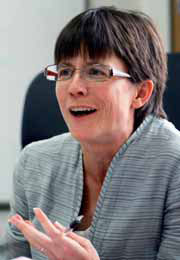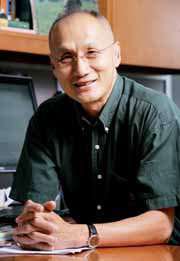Changing role
Updated: 2012-05-11 08:38
By Meng Jing (China Daily)
|
|||||||||
Lack of experience
But there is another reason for the "tension". China's own grant-making organizations are reluctant to support small grassroots NGOs due to their lack of experience and their lower capabilities when compared with well-developed international NGOs.
For the country's 2,500-odd foundations, it is not fundraising that is a challenge but rather choosing the right NGO and spending the money in the most effective way.
Feng Lun, chairman of the board of Beijing Vantone Real Estate Co and chairman of the Beijing-based SEE foundation, which is one of the largest private foundations in environmental protection in China, says it will be difficult for foundations to attract donors again if their projects cannot be run properly and fail to achieve satisfactory results.
Working with less competent organizations can also sometimes damage fundraising.
Giving even 100,000 yuan to a small organization to sort garbage in a residential community is proving to be a challenge, he says.
"You may find at the end of the year they still can't convince the property management of the community to let them in, let alone sort garbage," says Feng, whose SEE Foundation raises 20 million yuan to 30 million yuan a year from entrepreneurs and business tycoons in China, adding he is more confident of working with mature organizations, so that the projects his foundation invests in can achieve better performance.
Feng, who has initiated and co-founded six foundations in China, says it is quite clear that China has a long way to go in terms of developing professional NGOs, especially in aspects like the sustainable running of a long-term project and finding the right solutions to individual problems.
He highlights the operational model of the Washington-based The Nature Conservancy to further illustrate his point. Feng says that the organization sometimes purchases land and makes it private property to protect the endangered trees and species on it.
"We will never come up with that kind of idea by ourselves," Feng says, adding that by working with international organizations and hiring people who have work experience in international organizations, they can learn new ways of doing things.
This transfer of knowledge becomes extremely important especially when more Chinese organizations start doing charity abroad and more international NGOs start to look at China as strategic partners and are eager to bring China's technology, know-how, even extra money, to other countries in need.
|
Pia MacRae, China country director of Save the Children UK. Zhang Wei / China Daily |
The government-funded China Foundation for Poverty Alleviation has been assisting projects in Africa since 2007. Even China's private foundation SEE supported a UNEP program in Africa in 2010 with nearly 1.3 million yuan, which was about one-10th of the foundation's spending that year.
Despite China still having demand from within to address poverty, many international organizations feel that the nation's well-developed coastal areas can become donors not only for poor areas in China but also for underdeveloped areas in neighboring countries.
The US-based Heifer International has already reclassified China from a net receiver to strategic partner at the end of 2010, along with other BRIC countries.
Wang Chao, the Hong Kong-based China director of World Vision, one of the largest charities in the world with annual donations of more than $2.8 billion in 2011, also wants China to shoulder more responsibility in giving.
Wang says the Chinese mainland still has some way to go before it can become a net donor, such as the US and Hong Kong, which accounted for most of the $39.9 million that World Vision spent on China last year. "But there will be money in and money out," Wang says, adding that's why he always thinks that his organization is better off nurturing local NGOs than just providing poverty alleviation.
|
Ray Yip, chief representative of the Bill & Melinda Gates Foundation in China. Provided to China Daily |
China experience
International NGOs are not only eyeing the financial support that China can provide. With the country making progress in many areas, they also want to bring China's experience and knowledge of handling things to other countries.
Pia MacRae, China country director of Save the Children UK, says the international organization is committed to its work in China not only because it believes it can contribute to the tremendous effort already taking place to provide China's children access to quality education, health and protection.
"It is also because of China's global influence on children's issues. China is responding to children's issues in many innovative ways; we are learning from China and we hope to bring China's best practices to other countries," she says.
There is no doubt that China is on the fast track of development economically and socially. It has the capability to solve the challenges of developing economy and it is generous to those in need.
"It is critical for us to take advantage of the Chinese government's willingness to continue investing in solutions that impact poor nations and poor communities," says Yip from the Bill & Melinda Gates Foundation China, adding he is optimistic that China will become a meaningful provider with more investment from the government and overseas Chinese coming back.
Contact the writer at mengjing@chinadaily.com.cn

 Relief reaches isolated village
Relief reaches isolated village
 Rainfall poses new threats to quake-hit region
Rainfall poses new threats to quake-hit region
 Funerals begin for Boston bombing victims
Funerals begin for Boston bombing victims
 Quake takeaway from China's Air Force
Quake takeaway from China's Air Force
 Obama celebrates young inventors at science fair
Obama celebrates young inventors at science fair
 Earth Day marked around the world
Earth Day marked around the world
 Volunteer team helping students find sense of normalcy
Volunteer team helping students find sense of normalcy
 Ethnic groups quick to join rescue efforts
Ethnic groups quick to join rescue efforts
Most Viewed
Editor's Picks

|

|

|

|

|

|
Today's Top News
Chinese fleet drives out Japan's boats from Diaoyu
Health new priority for quake zone
Inspired by Guan, more Chinese pick up golf
Russia criticizes US reports on human rights
China, ROK criticize visits to shrine
Sino-US shared interests emphasized
China 'aims to share its dream with world'
Chinese president appoints 5 new ambassadors
US Weekly

|

|









